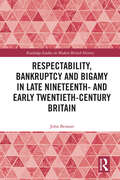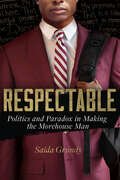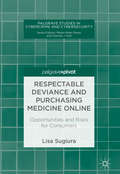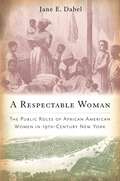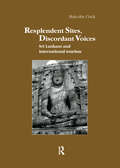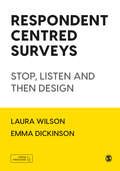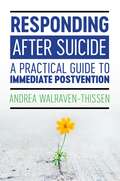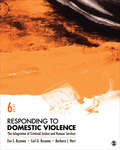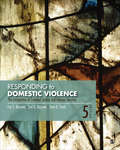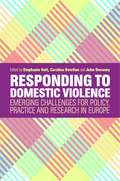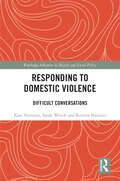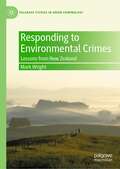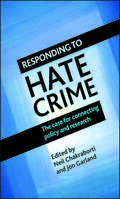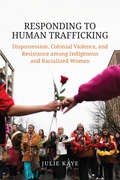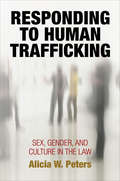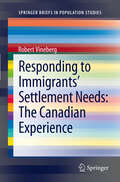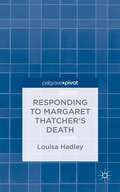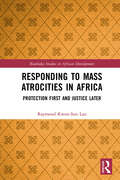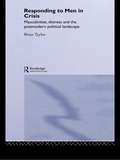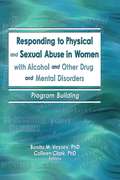- Table View
- List View
Respectability, Bankruptcy and Bigamy in Late Nineteenth and Early Twentieth-Century Britain (Routledge Studies in Modern British History)
by John BensonRespectability, Bankruptcy and Bigamy in Late Nineteenth and Early Twentieth-Century Britain explores the vexed question of middle-class respectability in Victorian and Edwardian Britain. It focuses upon the life of London solicitor Hamilton Pawley (1860–1936), who was barred from working by the Law Society, twice declared bankrupt, and in 1919 was sentenced to eighteen months’ imprisonment with hard labour for bigamously marrying a woman practically forty years his junior. If Pawley did not suffer the revenge of respectable society, it is difficult to think who would. Drawing upon the fact that the disgraced and the disreputable have always tended to attract a disproportionate amount of attention, the book ranges widely, exploring such important issues as middle-class education, career choices, the dynamics of family life, and the workings of the late nineteenth and early twentieth-century legal system. It shows that Pawley was able to hold on to his professional – and even gentlemanly – status for far longer than seemed likely. This all suggests, the book concludes, that although respectability was as important to the middle class as we have always been told, it was both easier to acquire and easier to retain than we have generally been led to believe. This book will appeal to all those interested in British society in the late nineteenth and early twentieth centuries.
Respectable: Politics and Paradox in Making the Morehouse Man
by Saida GrundyThe making of a culture of Black male respectability at Morehouse that underlines conservative notions of gender and class—by a former Spelman student who was once "Miss Morehouse." How does it feel to be groomed as the "solution" to a national Black male "problem"? This is the guiding paradox of Respectable, an in-depth examination of graduates of Morehouse College, the nation's only historically Black college for men. While Black male collegians are often culturally fetishized for "beating the odds," the image of Black male success that Morehouse assiduously promotes and celebrates is belied by many of the realities that challenge the students on this campus. Saida Grundy offers a unique insider perspective: a graduate of Spelman college and a former "Miss Morehouse," Grundy crafts an incisive feminist and sociological account informed by her personal insights and scholarly expertise.Respectable gathers the experiences of former students and others connected to Morehouse to illustrate the narrow, conservative vision of masculinity molded at a competitive Black institution. The thirty-two men interviewed unveil a culture that forges confining ideas of respectable Black manhood within a context of relentless peer competition and sexual violence, measured against unattainable archetypes of idealized racial leadership. Grundy underlines the high costs of making these men—the experiences of low-income students who navigate class issues at Morehouse, the widespread homophobia laced throughout the college's notions of Black male respectability, and the crushingly conformist expectations of a college that sees itself as making "good" Black men. As Morehouse's problems continue to pour out into national newsfeeds, this book contextualizes these issues not as a defect of Black masculinity, but as a critique of what happens when an institution services an imagination of what Black men should be, at the expense of more fully understanding the many ways these young people see themselves.
Respectable Citizens
by Lara A. CampbellHigh unemployment rates, humiliating relief policy, and the spectre of eviction characterized the experiences of many Ontario families in the Great Depression. Respectable Citizens is an examination of the material difficulties and survival strategies of families facing poverty and unemployment, and an analysis of how collective action and protest redefined the meanings of welfare and citizenship in the 1930s.Lara Campbell draws on diverse sources including newspapers, family and juvenile court records, premiers' papers, memoirs, and oral histories to uncover the ways in which the material workings of the family and the discursive category of 'respectable' citizenship were invested with gendered obligations and Anglo-British identity. Respectable Citizens demonstrates how women and men represented themselves as entitled to make specific claims on the state, shedding new light on the cooperative and conflicting relationships between men and women, parents and children, and citizen and state in 1930s Canada.
Respectable Deviance and Purchasing Medicine Online
by Lisa SugiuraThis is a unique interdisciplinary exploration of the contemporary phenomenon of online medicine purchasing. In this research, Sugiura provides a criminological understanding of the sale of online medicines as well as the traditional illegal markets. Crucially, the practice is investigated from the perspective of web users, moving beyond the headlines and warning campaigns to contextualise the provision of medicines online, to describe this practice and subjective accounts of purchasing medicines from the Web. Drawing together established deviance theories, Respectable Deviance and Purchasing Medicine Online considers the construction of online medicine purchasing, the justifications presented to challenge how it is labelled, and how the behaviour is managed to show how the framing of risks and deviance is challenged online. Offering a much-needed a critical overview of the UK healthcare regulatory system, Sugiura also analyses literature, data and policy documents originating from different countries highlighting that the geographical locations of participants in web forums, online surveys and non-face-to-face interviews cannot always be verified. With broad implications for regulation and safety surrounding medicines online, this innovative and timely study contributes to current online healthcare debates and broadens our understanding of cybercrime. It will be of particular interest to scholars of cybercrime and those interested in the changing nature of deviance.
A Respectable Woman: The Public Roles of African American Women in 19th-Century New York
by Jane E. DabelIn the nineteenth century, New York City underwent a tremendous demographic transformation driven by European immigration, the growth of a native-born population, and the expansion of one of the largest African American communities in the North. New York's free blacks were extremely politically active, lobbying for equal rights at home and an end to Southern slavery. As their activism increased, so did discrimination against them, most brutally illustrated by bloody attacks during the 1863 New York City Draft Riots.The struggle for civil rights did not extend to equal gender roles, and black male leaders encouraged women to remain in the domestic sphere, serving as caretakers, moral educators, and nurses to their families and community. Yet as Jane E. Dabel demonstrates, separate spheres were not a reality for New York City's black people, who faced dire poverty, a lopsided sex ratio, racialized violence, and a high mortality rate, all of which conspired to prevent men from gaining respectable employment and political clout. Consequently, many black women came out of the home and into the streets to work, build networks with other women, and fight against racial injustice. A Respectable Woman reveals the varied and powerful lives led by black women, who, despite the exhortations of male reformers, occupied public roles as gender and race reformers.
Resplendent Sites, Discordant Voices: Sri Lankans and International Tourism (Studies in Anthropology and History #Vol. 8)
by Malcolm CrickFirst Published in 1994. Studies in Anthropology and History is a series that will develop new theoretical perspectives, and combine comparative and ethnographic studies with historical research. The notion that tourism is the largest industry in the world seems to have acquired a wide currency over the past few years. This book looks at the recent growth of anthropological interest in tourism with suggestions as to some key issues where anthropological interests and tourism coincide; using field work and investigations in Sri Lanka.
Respondent Centred Surveys: Stop, Listen and then Design
by Laura Wilson Emma DickinsonAchieve your survey goals by empowering your survey respondents. Too often, surveys are designed for the analyst, rather than the respondent. This book challenges the status quo by putting respondents’ needs at the heart of survey development. It encourages you to stop, listen, and then design to improve response rates and collect high quality data. Drawing on their experience at the UK Office for National Statistics, the authors: Show you how to design better surveys by combining social research and user experience best practice. Equip you with the tools to design inclusive and accessible surveys. Enable you to overcome practical research problems, including managing participant recruitment, and working to any budget. Provide links to helpful web material and further reading as part of the book′s online resources. Promoting a new way to conceptualise and conduct survey design, this book expands your theoretical thinking and shows you, step-by-step, how to put it into practice.
Respondent Centred Surveys: Stop, Listen and then Design
by Laura Wilson Emma DickinsonAchieve your survey goals by empowering your survey respondents. Too often, surveys are designed for the analyst, rather than the respondent. This book challenges the status quo by putting respondents’ needs at the heart of survey development. It encourages you to stop, listen, and then design to improve response rates and collect high quality data. Drawing on their experience at the UK Office for National Statistics, the authors: Show you how to design better surveys by combining social research and user experience best practice. Equip you with the tools to design inclusive and accessible surveys. Enable you to overcome practical research problems, including managing participant recruitment, and working to any budget. Provide links to helpful web material and further reading as part of the book′s online resources. Promoting a new way to conceptualise and conduct survey design, this book expands your theoretical thinking and shows you, step-by-step, how to put it into practice.
Responding After Suicide: A Practical Guide to Immediate Postvention
by Andrea Walraven-ThissenThis practical guide about what first responders should do after a suicide, offers advice on identifying and recording a death as suicide, breaking the bad news and dealing with the impact of suicide in the short, middle and long term.Drawing on her own experience as a first responder and trainer, the author provides guidance and tips for best practice when responding to a suicide. These include what can happen to the body in the immediate aftermath, how to talk to the bereaved to limit or prevent secondary trauma, and how to manage suicide in public arenas such as schools. The scenarios covered include detailed scripts of how to deal with difficult situations. There are also sections that tackle complex issues such as religious or cultural customs, and unusual cases of suicide which can pose extra challenges.Straightforward and full of sage advice, each chapter includes real-world examples from the author's many years working as a first responder which highlight how suicide postvention techniques can be applied.
Responding to Domestic Violence: The Integration of Criminal Justice and Human Services
by Eve S. Buzawa Carl G. Buzawa Barbara J. HartA fresh look at the response to domestic violence in the United States today by experts in their field. Responding to Domestic Violence explores the response to domestic and intimate partner violence by the criminal justice system as well as public and non-profit social service and health care agencies. After providing a brief theoretical overview of the causes of domestic violence and its prevalence in society, the expert author team covers such key topics as barriers to intervention, variations in arrest practices, the role of state and federal legislation, and case prosecution. Focusing on both survivors and offenders, the book provides a thorough exploration of modern strategies to address the realities and needs of all survivors. The new edition offers new chapters on Special Populations at Risk, Victim Services, Coercive Control, Intimate Partner Stalking, and Civil and Criminal Protection Orders. All remaining chapters have been substantially or completely rewritten to reflect the growing body of research in the field.
Responding to Domestic Violence: The Integration of Criminal Justice and Human Services
by Eve S. Buzawa Carl G. Buzawa Barbara J. HartA fresh look at the response to domestic violence in the United States today by experts in their field. Responding to Domestic Violence explores the response to domestic and intimate partner violence by the criminal justice system as well as public and non-profit social service and health care agencies. After providing a brief theoretical overview of the causes of domestic violence and its prevalence in society, the expert author team covers such key topics as barriers to intervention, variations in arrest practices, the role of state and federal legislation, and case prosecution. Focusing on both survivors and offenders, the book provides a thorough exploration of modern strategies to address the realities and needs of all survivors. The new edition offers new chapters on Special Populations at Risk, Victim Services, Coercive Control, Intimate Partner Stalking, and Civil and Criminal Protection Orders. All remaining chapters have been substantially or completely rewritten to reflect the growing body of research in the field.
Responding to Domestic Violence: The Integration of Criminal Justice and Human Services
by Eve S. Buzawa Carl G. Buzawa Evan D. StarkThis new edition of the bestselling Responding to Domestic Violence explores the response to domestic violence today, not only by the criminal justice system, but also by public and non-profit social service and health care agencies. After providing a brief theoretical overview of the causes of domestic violence and its prevalence in our society, the authors cover such key topics as barriers to intervention, variations in arrest practices, the role of state and federal legislation, and case prosecution. Focusing on both victims and offenders, the book includes unique chapters on models for judicial intervention, domestic violence and health, and children and domestic violence. In addition, this edition provides an in-depth discussion of the concept of coercive control in domestic violence and its importance in understanding victim needs. Finally, this volume includes international perspectives in order to broaden the reader's understanding of alternative responses to the problem of domestic violence.
Responding to Domestic Violence: The Integration of Criminal Justice and Human Services
by Eve S. Buzawa Carl G. Buzawa Evan D. StarkThis new edition of the bestselling Responding to Domestic Violence explores the response to domestic violence today, not only by the criminal justice system, but also by public and non-profit social service and health care agencies. After providing a brief theoretical overview of the causes of domestic violence and its prevalence in our society, the authors cover such key topics as barriers to intervention, variations in arrest practices, the role of state and federal legislation, and case prosecution. Focusing on both victims and offenders, the book includes unique chapters on models for judicial intervention, domestic violence and health, and children and domestic violence. In addition, this edition provides an in-depth discussion of the concept of coercive control in domestic violence and its importance in understanding victim needs. Finally, this volume includes international perspectives in order to broaden the reader's understanding of alternative responses to the problem of domestic violence.
Responding to Domestic Violence: Emerging Challenges for Policy, Practice and Research in Europe
by Stephanie Holt Carolina Øverlien John Devaney Joanna Goodey Philip McCormack Zuzana Ocenasova Hana Smitkova Claire Houghton Sibel Korkmaz Maria Pentaraki Nicola McConnell Julie Taylor Matt Barnard Dr Declan Coogan Per Moum Hellevik Nusha Yonkova Gloria Kirwan Dalila Cerejo Els Leye Ingunn Rangul Askeland Marius Råkil Lucy Potter Gene Feder Elizabeth Martin Gemma Carney Davina James-HanmanThis book offers a critical overview of established and emerging manifestations of domestic violence across Europe. It describes how countries within and outside the EU are responding to the problem in policy, practice and research. Eminent academics and professionals from a range of European countries share their findings from new groundbreaking victim surveys, and weigh up the legal, social and healthcare challenges. The issues addressed include: - the cultural challenges of combating abuse forms most prevalent in migrant communities such as female genital mutilation and forced marriage; - emerging problems such as child-to-parent violence, teenage relationship violence and digital intimate partner abuse; and - barriers to help-seeking faced by marginalised victims such as LGBTQ and older people. By showcasing the most effective responses formulated in Europe and exploring innovative ways to research and understand domestic violence, this book is a crucial resource for all those with responsibility for implementing social policy and good practice.
Responding to Domestic Violence: Difficult Conversations (Routledge Advances In Health And Social Policy Ser.)
by Kate Seymour Sarah Wendt Kristin NatalierThis book reflects on the problem of domestic violence by thinking critically about policy and practice responses. Moving beyond accounts of men’s violence embedded in metaphors of ‘good’ and ‘bad men’, or as the expressions of particular structures and practices, it initiates challenging conversations concerning the ways in which our embeddedness in gendered discourses shapes the responses that we imagine are possible and desirable. Innovative in its embrace of feminist poststructural theorising to both challenge and enrich responses to men’s use of domestic violence, each chapter is dedicated to exploring a particular area of tension, unpicking the tangles and knots of complexity that characterise much domestic violence policy and practice. Case studies ground the chapters, providing a focus for thinking through the dilemmas, challenges, and contested nature of ideas, meanings, and practices in this space. Rather than presenting easy answers, each chapter provides a forum for the exploration of ambiguity and complexity – to acknowledge the discomfort and sit with this, not rush to resolve it. Situated within this contested, uncomfortable terrain, this book presents a small – but important – step towards a reimagining of the ways in which we think about and respond to domestic violence. It will be of interest to scholars and students of gender studies, sociology, health, and social care.
Responding to Environmental Crimes: Lessons from New Zealand (Palgrave Studies in Green Criminology)
by Mark WrightThis book provides a critical study of environmental regulation and its enforcement in New Zealand, situated within green criminology. It seeks to address the question of whether the offences in the Resource Management Act 1991 are 'working', by drawing on a range of sources including: central government data, local government policies and reports on enforcement, information requests of councils, studies of local authority enforcement behaviour and case law to. Through highly layered and richly textured analysis, the project exposes the problems that can arise when an expansive approach is taken to offences, penalties and institutional arrangements in an environmental regulatory statute. It emphasizes how discussions of harm and what should be unlawful will ensure that law-makers' enforcement tools will align with their goals for punishment. It examines higher-level issues such as ‘wrongfulness’ and ‘criminality’ in the environmental regulatory context and explores the relevance of its findings to jurisdictions outside of New Zealand. It also discusses the pros and cons of criminalisation and punishment versus restoration. It speaks to those interested in green criminology, regulatory compliance and enforcement, and applications of criminal law.
Responding to Global Poverty
by Gerhard Øverland Christian BarryThis book explores the nature of moral responsibilities of affluent individuals in the developed world, addressing global poverty and arguments that philosophers have offered for having these responsibilities. The first type of argument grounds responsibilities in ability to avert serious suffering by taking on some cost. The second argument seeks to ground responsibilities in the fact that the affluent are contributing to such poverty. The authors criticise many of the claims advanced by those who seek to ground stringent responsibilities to the poor by invoking these two types of arguments. It does not follow from this that the affluent are meeting responsibilities to the poor. The book argues that while people are not ordinarily required to make large sacrifices in assisting others in severe need, they are required to incur moderate costs to do so. If the affluent fail consistently to meet standards, this fact can substantially increase the costs they require to bear to address it.
Responding to Hate Crime: The Case for Connecting Policy and Research
by Neil Chakraborti and Jon GarlandWhy has so much hate crime policy seemingly ignored academic research? And why has so much research been conducted without reference to policy? This book bridges the gap between research and policy by bringing together internationally renowned hate crime experts from the domains of scholarship, policy and activism. It provides new perspectives on the nature of hate crime victimisation and perpetration, and considers an extensive range of themes, challenges and solutions which have previously been un- or under-explored. In doing so, the book offers innovative ways of combating and preventing hate crime that combine cutting-edge research with the latest in professional innovations. Essential reading for students, academics and practitioners working across a range of disciplines including criminology, sociology and social policy, Responding to Hate Crime makes a clear and compelling case for closer and more constructive partnerships between scholars and policy makers.
Responding to Human Trafficking: Dispossession, Colonial Violence, and Resistance among Indigenous and Racialized Women
by Julie KayeResponding to Human Trafficking is the first book to critically examine responses to the growing issue of human trafficking in Canada. Julie Kaye challenges the separation of trafficking debates into international versus domestic emphases and explores the tangled ways in which anti-trafficking policies reflect and reinforce the settler-colonial nation-building project of Canada. In doing so, Kaye reveals how some anti-trafficking measures create additional harms for the individuals they are trying to protect, particularly migrant and Indigenous women. The author’s critical examination draws upon theories of post- and settler-colonialism, Indigenous feminist thought, and fifty-six interviews with people in counter-trafficking employment across Western Canada. Responding to Human Trafficking provides a new framework for critical analyses of anti-trafficking and other rights-based and anti-violence interventions. Kaye disrupts measures that contribute to the insecurity experienced by trafficked women and individuals affected by anti-trafficking responses by pointing to anti-colonial organizing and the possibilities of reciprocity in relationships of care.
Responding to Human Trafficking: Sex, Gender, and Culture in the Law (Pennsylvania Studies in Human Rights)
by Alicia W. PetersSigned into law in 2000, the Trafficking Victims Protection Act (TVPA) defined the crime of human trafficking and brought attention to an issue previously unknown to most Americans. But while human trafficking is widely considered a serious and despicable crime, there has been far less consensus as to how to approach the problem—owing in part to a pervasive emphasis on forced prostitution that overshadows repugnant practices in other labor sectors affecting vulnerable populations. Responding to Human Trafficking examines the ways in which cultural perceptions of sexual exploitation and victimhood inform the drafting, interpretation, and implementation of U.S. antitrafficking law, as well as the law's effects on trafficking victims.Drawing from interviews with social workers and case managers, attorneys, investigators, and government administrators as well as trafficked persons, Alicia W. Peters explores how cultural and symbolic frameworks regarding sex, gender, and victimization were incorporated into the drafting of the TVPA and have been replicated through the interpretation and implementation of the law. Tracing the path of the TVPA over the course of nearly a decade, Responding to Human Trafficking reveals the profound gaps in understanding that pervade implementation as service providers and criminal justice authorities strive to collaborate and perform their duties. Ultimately, this sensitive ethnography sheds light on the complex and wide-ranging effects of the TVPA on the victims it was designed to protect.
Responding to Immigrants' Settlement Needs: The Canadian Experience
by Robert VinebergWhile much has been written about Canada's modern settlement program and there is a growing body of research and analysis of the settlement and integration successes and challenges of recent years, there is virtually no literature that has addressed the history of settlement services since the beginning of immigration to Canada. Some survey histories of Canadian Immigration have touched on elements of settlement policy but no history of services to immigrants in Canada has been published heretofore. Responding to Immigrants' Settlement Needs: The Canadian Experience addresses this gap in the historiography of Canadian Immigration. From the tentative steps taken by the pre-Confederation colonies to provide for the needs of arriving immigrants, often sick and destitute, through the provision of accommodation and free land to settlers of a century ago, to today's multi-faceted settlement program, this book traces a fascinating history that provides an important context to today's policies and practices. It also serves to remind us that those who preceded us did, indeed, care for immigrants and did much to make them feel welcome in Canada. The Canadian experience in integration, over the past two centuries, suggests many policy-related research themes for further exploration both in Canada and in other immigrant receiving countries.
Responding to Margaret Thatcher’s Death
by Louisa HadleyLouisa Hadley examines the range of responses to Margaret Thatcher's death in relation to the cultural discourses surrounding Thatcher in the 1980s and since her resignation. The responses examined include the anticipation of Thatcher's death in anti-Thatcher songs, social media responses, obituaries, picture tributes and the ceremonial funeral.
Responding to Mass Atrocities in Africa: Protection First and Justice Later (Routledge Studies in African Development)
by Raymond Kwun-Sun LauThis book explores the relationship between the Responsibility to Protect (R2P) and the International Criminal Court (ICC), challenging the assumption that they are always mutually reinforcing or complementary, and examining instead the many tensions which arise between the immediate imperative of saving lives, and the more long-term prospect of punishing perpetrators and preventing future conflicts through deterrence. Around the world, audiences in the mid-1990s watched the mass atrocities unfolding in Rwanda and Srebrenica in horror and disbelief. Emerging from these disasters came an international commitment to safeguard and protect vulnerable communities, as laid out in the R2P principle, and an international responsibility to punish perpetrators, with the establishment of the ICC. The book provides context-independent proposals for resolving contradictions between the two principles, suggesting that focusing on timing and sequencing in invoking international R2P and ICC actions could facilitate the easing of tensions. Drawing on examples from Uganda, Kenya, and Darfur, the book applies International Relations concepts and theories in order to deepen our understanding of international responses to mass atrocities. Ultimately the book concludes that a 'Protection First, Justice Later' sequence approach is necessary for managing the tension and facilitating more effective and consistent international responses. This book makes an important contribution to discussions and debates surrounding international responses to genocide and mass atrocities. It will be of special interest to scholars, students and policymakers in International Relations, Global Governance, African Studies, International Development, Human Rights and International Criminal Law.
Responding to Men in Crisis: Masculinities, Distress And The Postmodern Political Landscape
by Brian TaylorResponding to Men in Crisis is based on new research looking at gendered assumptions about rationality and men's mental health. It looks at postmodern theory in relation to masculinities and madness, and discusses key contemporary debates in political uses of risk, dangerousness and so on. The author relates this to a discussion of current policy and practice responses to men within the mental health system. It offers the reader a theoretical exploration of a topically and politically sensitive issues and is relevant to service user involvement and survivor movements, making it essential reading for academics and students of sociology and allied disciplines.
Responding to Physical and Sexual Abuse in Women with Alcohol and Other Drug and Mental Disorders: Program Building
by Bonita Veysey Colleen ClarkLearn from the experiences of these program sites to develop better services for women with co-occurring disorders and histories of violenceThis book explores the efforts of the Women, Co-Occurring Disorders and Violence Study to address the significant lack of appropriate services for women trauma survivors with co-occurring mental health and substance use disorders. Experts describe the services integration programs of nine participating sites that address the multiple needs of these women. In this guide, you will find useful strategies for integrating services that are responsive to the strengths and needs of the individual as well as the community.This vital resource examines how-over a period of five years-sites designed, implemented, and evaluated their interventions. You will learn how sites developed their strategies for integrating services at both the clinical/individual level and at the services or systems level. The book also shows how trauma-informed, gender-specific, culturally competent care fosters treatment that is sensitive to related issues such as children and parenting, interpreting culture cues, and socioeconomic difficulties. In Responding to Physical and Sexual Abuse in Women with Alcohol and Other Drug and Mental Disorders, you will learn about the details of nine different programs, including: Franklin County Women&’s Research Project-a collaborative project for rural women, designed and operated by local consumer/survivor/recovering women (CSRs) The Triad Women&’s Project-a semi-rural comprehensive system of care to respond to the needs of women and children The Women Embracing Life and Living (WELL) Project-interventions include trauma, parenting, systems integration and mutual help groups withIntegrated Care Facilitators providing resource coordination and advocacyservices PROTOTYPES, Centers for Innovation in Health, Mental Health, and Social Services-the three levels of integration the Systems Change Center implemented the Boston Health Commission-an integrated model of trauma-informed services culturally and linguistically appropriate for its service population of primarily poor Latina and African American women Palladia&’s Portal Project-a comprehensive trauma-informed intervention designed to put trauma and safety first to assist women remaining in treatment Arapahoe House&’s New Directions for Families-a family-oriented intervention for women and their dependent children Allies-comprehensive, integrated services for women as well as intervention for their children, ages 5-10The District of Columbia Trauma Collaboration Study (DCTCS)-a two-phase project addressing the needs of dually diagnosed women trauma survivors Responding to Physical and Sexual Abuse in Women with Alcohol and Other Drug and Mental Disorders provides you with first-hand accounts of the process by which programs and service systems were transformed. As challenges were met and strategy was adapted to "real world" situations, the sites discussed in this text found new and improved methods for helping this unique group of women. The book offers tips, solutions, and possibilities to mental health professionals, substance abuse professionals, and domestic violence professionals, and even patients and/or clients searching for support.
